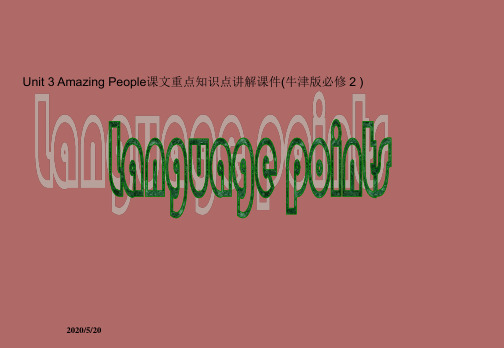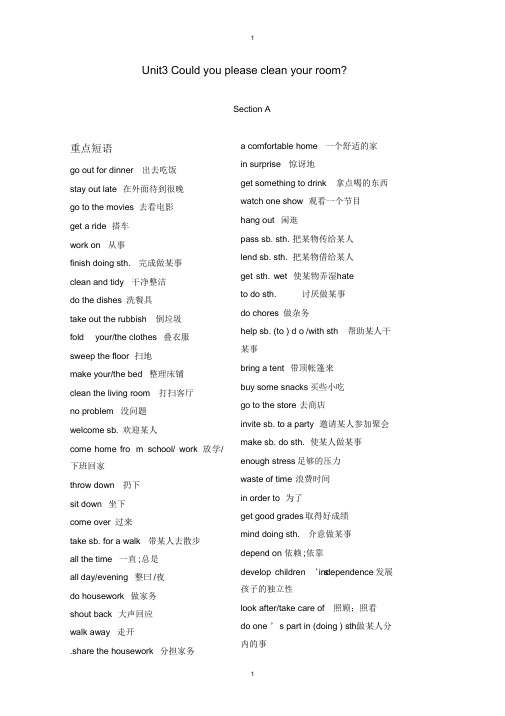unit3课文精讲
- 格式:doc
- 大小:180.50 KB
- 文档页数:22



Unit3 Could you please clean your room?Section A重点短语go out for dinner 出去吃饭stay out late 在外面待到很晚go to the movies 去看电影get a ride 搭车work on 从事finish doing sth. 完成做某事clean and tidy 干净整洁do the dishes 洗餐具take out the rubbish 倒垃圾fold your/the clothes 叠衣服sweep the floor 扫地make your/the bed 整理床铺clean the living room 打扫客厅no problem 没问题welcome sb. 欢迎某人come home fro m school/ work 放学/ 下班回家throw down 扔下sit down 坐下come over 过来take sb. for a walk 带某人去散步all the time 一直;总是all day/evening 整曰/夜do housework 做家务shout back 大声回应a comfortable home 一个舒适的家in surprise 惊讶地get something to drink 拿点喝的东西watch one show 观看一个节目hang out 闲逛pass sb. sth. 把某物传给某人lend sb. sth. 把某物借给某人get sth. wet 使某物弄湿hateto do sth. 讨厌做某事do chores 做杂务help sb. (to ) d o /with sth 帮助某人干某事bring a tent 带顶帐篷来buy some snacks 买些小吃go to the store 去商店invite sb. to a party 邀请某人参加聚会make sb. do sth. 使某人做某事enough stress 足够的压力waste of time 浪费时间in order to 为了get good grades 取得好成绩mind doing sth. 介意做某事depend on 依赖;依靠develop children ’in s dependence 发展孩子的独立性look after/take care of 照顾;照看walk away 走开.share the housework 分担家务do one ’s part in (doing ) sth做.内的事某人分二、重点句型1. Could you please ..do sth. ? Could you please clean your room? 你能整理一下你的房间吗?2. I have to do some work. 我必须干些活。



1杨磊译注必修三Unit 3 课文详解必修三 Unit 3 The Million Pound Band Note百万英镑Act I, Scene 3Narrator: It is the summer of 1903.Two old and wealthy brothers, Roderick 年的夏天。
这是1903and Oliver, have made a bet.两个年迈而富有的兄弟:罗德里克和奥利弗,进行打赌。
【注释:make a betOliver believes that with a 】。
我擅长打足彩football 310.310eg. I'm good at making a bet on 打赌million pound bank note a man could survive a month in London.奥利弗认为一个拥有一百万英镑支票的人能在伦敦生存一个月。
【注释:survive vi.幸存, 活下来eg. These plants cannot survive in very coldHis brother Roderick doubts it. At this他的哥哥对此怀疑。
conditions.这些植物在严寒中不能存活。
】moment, they see a penniless yound man wandering on the pavement outside their house.就在这时,他们看见一位身无分文的年轻人正在他家外的人行道上徘徊。
【注释:on the pavement徘徊街头,没有住处,被遗弃;wandering adj. 漫游的;闲逛的;(精神)恍惚的;错乱的eg. 1) wandering thoughts 错It is Henry Adams,】2) I felt my attention wandering during the lecture.我感到听讲座时老走神。
Unit3What is your school like? 课文重点知识和语法讲解一、重要短语1.in front of 在…前面2.next to紧挨着3.across from在…对面4.between…and….在…和…之间5.be amazed at…对…感到惊讶6.in the middle of…在…中间7.at the back of…在…后面8.put up important notices张贴重要的告示9.on the sports field 在运动场上10.s ome pictures of famous people一些名人的照片11.o n the wall在墙上12.t he teacher’s desk 讲桌13.l ist your favorite places 例举出你最喜欢的地点14.s hare …with 与…分享15.b e different from 与…不同16.m any modern buildings 许多现代的大楼17.d o exercises 做体操18.r aise the flag 升旗19.a special way 一种特殊的方式20.s tart the week 开始这周21.m ost of the time大半部分时间22.c hange seats换座位23.m y best friend 我最好的朋友24.m any kinds of food许多种类的食物25.b e similar to 与…相似26.B ye for now再见27.m y favorite place 我最喜欢的地方28.a group of 一群…29.t ake turns to do 轮流做某事30.t he locations of things物品的位置31.i ntroduce my school 介绍我的学校32.d escribe the places I like 描述我喜欢的地点33.s tart our dreams 开始我们的梦想二、重要句型知识点讲解1.It’s in front of the art building. 它在艺术楼的前面【辨析】in front of 与in the front ofin the front of... 在……(里面的)前部反义词组:at the back of...在……后面in front of...在……(外部的)前面反义词:behind在……后面He is standing in front of the car.他站在汽车前面。
Unit 3 Could you please tell me where the restrooms are?Section A: 礼貌问路及询问其他信息;Section B: 学会礼貌用语,做文明礼貌的人。
一. 语法:含关联词what, who, where, why, how 的宾语从句。
在复合句中, 由一个句子充当宾语,这个句子叫宾语从句。
引导宾语从句的常见关联词有 that, whether, if, what, who, where, why 和 how 等。
本单元主要学习含关联词what, who, where, why, how 的宾语从句。
本单元例句:1. Could you please tell me where the restrooms are?2. Do you know when the bookstore closes today?3. I wonder how this CD player works.4. Can you tell me who she is?5. Could you tell me how to get to the post office?6. I don ’t know what to do.总结:宾语从句结构:特殊疑问词+ ___________________________________________时态分析:_______________________________________________________________. 练习:1. Could you please tell me _______?A. where can I buy some booksB. where I can buy some books 2. They wonder ______.A. why the boy is so sadB. why is the boy so sad 3. Jim doesn’t know _______ next week.A. when the meeting will startB. when will the meeting startC. when the meeting startedD. when did the meeting start 4. Let me think about _______ since I was 10.A. how many books I readB. how many books did I readC. how many books I have readD. how many books have I read 5. The teacher teaches us ______.A. how solving the hard problemB. how to solve the hard problemC. how can we solve the hard problemD. solve the hard problem 二. U3-3a 文章聚焦: 方框句子还原 +方框句式总结+ 词汇句法Fun Times Park —Always a Fun Time![Alice and He Wei are in Space World.] Alice: 1. _______________________He Wei: How about that new ride over there? Alice: Well ... it looks scary.He Wei: Come on! I promise it’ll be exciting ! If you’re scared, just shout or hold my hand. [After the ride…]Alice: You were right, that was fun! I was scared at first, but shouting did help. He Wei: See, that wasn’t so bad, right? You never know until you try something. Alice: Yes, I’m so glad I tried it. Now I know I can do it and it’s actually fun! He Wei: Do you want to go to Water World now?Alice: Sure, but I’m getting hungry. 2. ________________________He Wei: Of course! I suggest Water City Restaurant in Water World. It serve s delicious food. Alice: Great! Let ’s go![On their way to Water City Restaurant, Alice and He Wei pass by Uncle Bob’s.]Alice: Oh, look! This restaurant looks interesting. The sign says a rock band plays here every evening.He Wei: Why don ’t we come back here for dinner later? 3. ____________________ [Alice and He Wei walk up to a staff person at the door.] He Wei: 4. _____________________Staff : Eight o’clock. The restaurant is always busy at that time, so come a little earlier to get a table.三. U3-2b 文章聚焦:段落大意+词汇句法Could You Please ...?1. ________________________ For example, you may ask “Where are the restroom s?” or “Could you please tell me where the restrooms are?” These are similar request s for direction s. Both are correct, but the first one sounds less polite. That is because it is a very direct question. It is not enough to just ask a question correctly . We also need to learn how to be polite when we ask for help.2. ________________________ The expressions they use might depend on whom they are speaking to or how well they know each other. It is all right to ask your classmates direct questionsbecause you know them well. However, if you say to your teacher, “When is the school trip?”, this might sound impolite. But if you say, “Excuse me, Mr. West. Do you know when the school trip is?”, this will sound much more polite.3. _________________________ They include expressions such as “Could you please ...?” or “Can I ask ...?” It sounds more polite to say, “Peter, could you please tell me your e-mail address?” than “Peter, tell me your e-mail address.” Sometimes we even need to spend time leading into a request. For example, we might first say to a stranger, “Excuse me, I wonder if you can help me” or “I’m sorry to trouble you, but ...” before asking for help.4. __________________________ However, it is important to learn how to use the rightlanguage in different situations. This will help you communicate better with other people.四. 课文对话,3a和2b 单词及句式梳理和记忆。
UNIT 3 My HobbySection A(P53--54)一、重点词汇:1、certainly (adv.) “当然,确定”——同意某人时一般可直接了当地回答。
(在表示委婉请求的问句中,肯定回答也可用certainly等词)同义词为:_____________/________________certainly的否定词为:“__________________ . 当然不是。
”——集邮一定很有趣!——当然了。
2、time① “时间”(不可数名词)。
如:在空闲时间(P55)② “次数”(可数名词)。
如:一天三次(P6)③ “时代”(可数名词)。
如:特殊时代(P53)3、valuable (adj.)“有价值的” _________________________非常有价值的它们中有些非常有价值。
(P53)____________________________________________________4、重点短语:①learn.........from.......... 向.......学习.......... (learn后接学习的内容,from后接学习的人或物)我们可以从邮票中学到很多有关人、地方、历史和特殊时代的事。
(P53)___________________________________________________________________________ __我们应该相互学习。
___________________________________________________________学习做某事_______________________我们应该学习照顾自己。
_________________________________5._____________________________ 对.......感兴趣(后接名词或动名词)我对运动感兴趣。
(P54)________________________二、重点句型:1、What things do you love doing ? 你喜欢做........东西?(things 作doing 的宾语——你喜欢收集什么东西?(P53)——我喜欢收集油画。
三、重点语法:1、_____________________. 过去常常做某事①表示过去的习惯、状态,因而常常用于过去形式,时态不变。
我过去常常听摇滚音乐。
(P53)②与一般动词相同,其否定形式用_________________,也可用_________________. 用前者较多。
他过去不常做运动。
________________________________________________③一般疑问句也跟一般动词相同,常用___________________......?也可用____________________________...... ?你过去常常去游泳吗?_____________________________________⑤有时替代前述的动词,以避免重复。
我现在不去游泳,但我过去常常去游。
________________________________2、must be 表示推测must be 表示推测,意为“一定”,“相必”(表示否定推测时,用can't be “不可能”)集邮一定很有趣_______________________它不可能是我的书,我的书在包里。
___________________________________Section B(P55--56)一、重点词汇:1、Maybe (副词)“也许,大概”(= perhaps)(注:may be 作谓语,是“情态动词+ 动词原形”形式)或许我需要改变一下。
(P55)2、______________________________做某事很有乐趣我们将进行趣味性阅读比赛。
3、miss ①错过(指没赶上或参加某个活动、聚会、学习等,也指没打中、看到、听到、拿到某个事物等)你不会错过(它)的。
(七下P41)你错过了一个好机会。
(P35)② “想念,思念”。
我妈和我非常想念他。
(P19)错过做某事_________________我错过了和他照相的机会。
________________________4、share “分享,共同使用”(P77)和某人分享某事、某物__________________________ 你能跟我分享我的兴趣吗?__________________________________(P56)我们共同分享快乐。
________________________________________5、重点短语:流行音乐在业余时间含有time 的短语:一直同时那时⑤ be fond of 喜爱,酷爱喜欢做某事________________________________ 我酷爱钓鱼。
__________________________________________二、重点句子:1、Why not + _________________(= Why don't you +___________“为什么不.........”“Why not + 动词原形”,形式上是否定,实际上是肯定建议。
为什么不去做些户外活动呢?(P55)2、答谢用语:不客气,不用谢。
①②③④3、________________________________一点也不......,根本不........我对运动一点也不感兴趣。
(P56)三、功能项目——表达“喜欢和不喜欢”:㈠、“喜欢”的表达:1、like 我喜欢收集硬币。
(P56)2、enjoy 我欣赏舞蹈。
(P56)3、prefer 我更喜欢棒球。
(P56)4、be fond of 我喜欢钓鱼。
(P56)5、used to 我过去常常听流行音乐。
(P56)6、be interested in 我对踢足球感兴趣。
㈡、“不喜欢”的表达:1、don't like(或doesn't like)我不喜欢观看篮球赛。
2、don't enjoy(或doesn't enjoy)我不欣赏做运动。
3、hate (后面可接动名词、不定式)我讨厌看小说。
4、prefer........to........我比较喜欢猪肉,不喜欢牛肉。
little和few都含有否定的意思。
表示“不多”;“很少”。
little相当于not much, few相当于not many。
little与____________连用, few与____________连用。
而a little和a few含有肯定的意思,表示“一些”;“几个”(虽然少,但有一些)。
如:1)I have___________________ time.我的时间很少。
2) I understood __________________ of his speech.他的话我没有明白多少。
3)__________________of the students passed the exam.没有几个学生考试及格。
4)__________________ people would agree with him.没有多少人同意他。
5)I know ____________French.我多少还懂点儿法语。
6) There’s __________________ water in the glass.杯子里还有点儿水。
7) Can you stay ___________________ days longer?你能多呆几天吗?8)I still have _________________ friends in Beijing.我在北京还有几个朋友。
Section C(P57--58)一、重点词汇:1、系动词get:(后接形容词)“变得”“变成”,表示状态的改变当人们生病时,这些爱好可以帮助他们尽快恢复健康。
(P57)天变得越来越冷了。
注意:become 与get ,turn 的区别:①become “变得,变成,成为”。
(常指身份、职位的变化),作瞬间动词时指“状态的变化。
”那个男孩生病了。
(14)(指状态变化,后接形容词)She becomes a doctor. 她成了一名医生。
(指身份、职位变化,后接名词)② get (连系动词),表示“逐渐变得”,后接形容词的原形或比较级。
天气变得越来越暖和。
(七下P83)③ turn “变得”(通常指变质、变色等)他的脸变红了。
2、well①(形容词)身体健康的,身体好的3、holiday , vacation 和leaveholiday (英)普通用语,指一个正式的假期。
vacation(美)普通用语,同英国的holiday。
在英国英语中,vacation则用来指大学的假期leave (尤指军队的)休假,假期;或病假等be on leave 休假四周的假期①(英国英语)病假请病假请三天假4、in front (of.....)与in the front (of......)in front (of.....)“在........前面” (两人(或物)不相隶属、互不包含)in the front (of......)“在某一范围以内的前头(前部)”(一人(或物)在另一人(或物)之内)我以前常在我家前面的池塘游泳。
(P57)教室的前头有个讲台和一块黑板。
二、重点句子:1、___________________________. 教某人干某事谁教你游泳?__________________________________自学某事物___________________ 我自学了三种语言。
____________________________ 2、____________________________ 带给某人某东西,把某东西带给某人人们有业余爱好是因为业余爱好能给他们带来快乐、友谊和知识。
(P58)三、重点语法:㈠、used to do 的一般疑问句和特殊疑问句:1、一般疑问句:跟一般动词相同,常用__________________.....?也可用_____________你过去常常去游泳吗?(P60)暑假期间你常去游泳吗?(P57)2、特殊疑问句:特殊疑问词+ 一般疑问句两年前你通常的业余爱好是什么?你过去常常去哪儿游泳?你过去有什么业余爱好?过去谁常常教你游泳?㈡、介词短语作定语:(通常放在名词的后面,修饰前面的名词)在我家前面的池塘里(P57)(介词短语in front of my house 作定语修饰名词pond )树下的女孩戴帽子的男孩Section D(P59--60)一、重点词汇:1、lovely (adj.)可爱的(love 喜欢)我愿意。